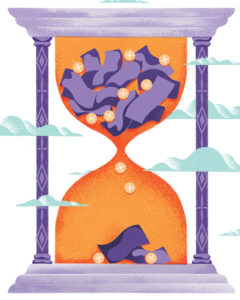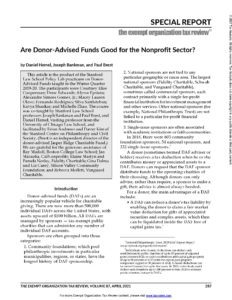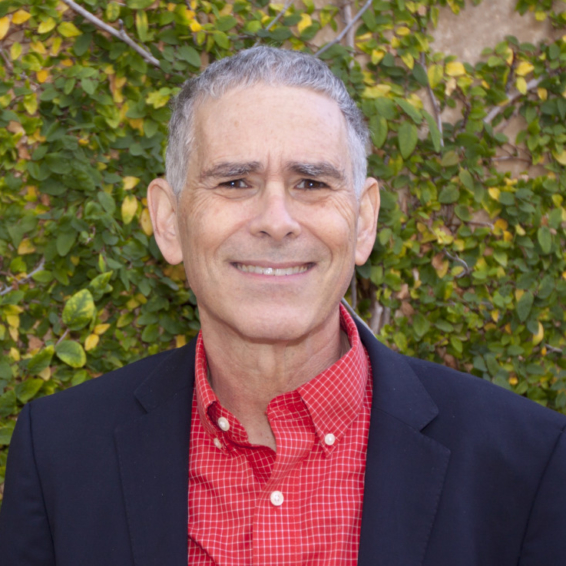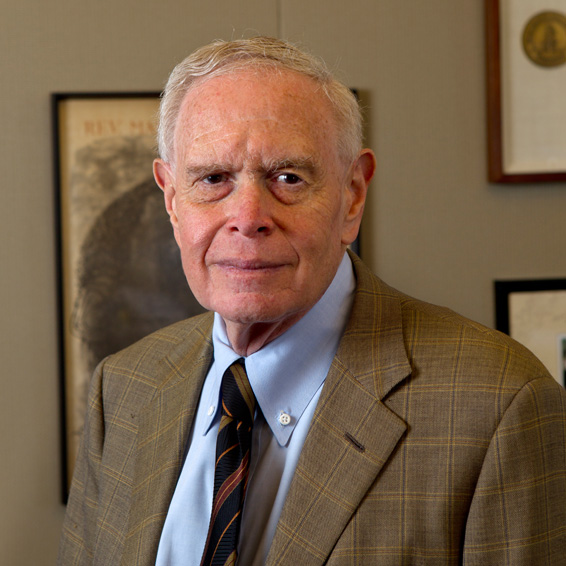Donor-Advised Funds and their Critics (807C)
The donor-advised fund (DAF) is an increasingly popular vehicle for charitable giving. Donors receive a tax deduction when they contribute money or appreciated assets to a DAF; at their discretion, donors (DAF “holders”) may advise the DAF manager, or “sponsor,” to distribute funds to tax-exempt charities. There are about 500,000 individual DAFs across the country, with total assets of over $100 billion. The major DAF sponsors are community foundations and the charitable arms of investment managers like Schwab, Fidelity, and Vanguard.
The donor-advised fund (DAF) is an increasingly popular vehicle for charitable giving. Donors receive a tax deduction when they contribute money or appreciated assets to a DAF; at their discretion, donors (DAF “holders”) may advise the DAF manager, or “sponsor,” to distribute funds to tax-exempt charities. There are about 500,000 individual DAFs across the country, with total assets of over $100 billion. The major DAF sponsors are community foundations and the charitable arms of investment managers like Schwab, Fidelity, and Vanguard. Although donors can only “advise” rather than “direct” a sponsor to make a gift, their advice is almost always heeded. DAFs arguably incentivize giving by providing a vehicle for donating complex assets and reducing a donor’s burdens by offloading administrative tasks to the DAF sponsor. Some DAF sponsors also offer advice to enable their DAF holders to give more effectively.
Yet DAFs have been criticized on several grounds, and legislation has been introduced (but not enacted) to regulate them. One criticism is that while donors receive the tax deduction immediately upon contributing to a DAF, they can take as long as they wish to make gifts from the DAF, and even pass advisory authority on to their heirs, thus delaying putting the funds into the hands of charities that can use them. (In comparison, foundations are required to spend at least 5 percent of their assets annually.) Another criticism is that gifts made through a DAF can be anonymous, with only the DAF sponsor listed as the donor. (In comparison, gifts and grants by foundations must be reported on publicly available tax returns.) In addition, some DAF sponsors have concerns about requests to make gifts to putative hate groups: how to determine whether an organization falls in this category, and how to respond to the request if it does.
At a time when the controversy around DAFs is only likely to grow, this Policy Lab practicum will provide an evidence-based analysis of the pros and cons of various self-reform and regulatory proposals. The research team will focus on understanding the perspectives of the recipients of DAF funding as well as those of DAF sponsors, DAF holders, regulators, and critics. As an additional resource, Independent Sector, the field’s major coalition of nonprofits, foundations, and corporate giving programs, has generously agreed to survey and introduce us to selected members to learn of their views and practices concerning DAFs and to advise the research team throughout the process. The research team will present its findings to clients and produce a public report.
Clients & Deliverables
Clients: Chicago Community Trust, Fidelity Charitable, Silicon Valley Community Foundation, Raikes Foundation, Schwab Charitable, SV2, and Stanford University
Deliverables: Client briefing and policy report; possible roundtable convening

Are Donor-Advised Funds Good for Nonprofits?
Published in Stanford Social Innovation Review (Fall 2020): Are Donor-Advised Funds Good for Nonprofits?
Illustration by Marina Muun




